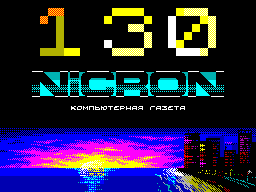|
Nicron #17
23 января 1997 |
|
Iron - an overview of the microprocessor Zilog Z380, continued.

MPU Z380
[Continued. Previous publications in the rooms 16,15,14,12,11,
10,9,8,7]
(C) WLODEK BLACK
The Group commands an 8-bit input / output.
Mnemonic Meaning Commentary
New commands:
INA A, (nn) A <- port (nn) bytes from the input port,
respectively directly addressable 16-bit hell resom
OUT (C), n port (C) <- n output constant, a member of the SOS
tav commands to the port, addressable a pair of
BC
OUTA (nn), A port (nn) <- A derivation of this battery
port, the addressed 16-bit values cheniem
within the team
16-bit direct address "nn" can be extended to
24 or 32 bits using DDIR.
Group instruction 16-bit input / output.
INW pp, (C) pp <- port (C) Enter the 16-bit values from
port, addressable by a pair BC, in
pair pp
INAW HL, (nn) HL (15-0) <- port (nn)
Enter the 16-bit values from
port, the addressed direct value Niemi nn, a
pair of HL
INIW (HL) <- port (DE) l; Enter the word from the port (DE)
(HL +1) <- port (DE) h; a memory address (HL)
BC (15-0) <- BC (15-0) -1; to count on a pair of BC
HL <- HL +2
INIRW Same with the organization of the cycle on a pair of BC,
while BC reaches 0
INDW How INIW, but with a decrement HL
INDRW Same with the organization of the cycle on a pair of BC,
while BC becomes equal to 0
OUTW (C), pp port (C) <- pp pp output value pair to a port
addressable by a pair BC
OUTW (C), nn port (C) <- nn output 16-bit constant nn,
part of the team,
port, addressable by a pair BC
OUTAW (nn), HL port (nn) <- HL (15-0)
Printing a pair HL to the port
addressable direct value nn
OUTIW port (DE) l <- (HL); the word out to the address (HL)
port (DE) h <- (HL +1); to the port (DE) with a readout
BC (15-0) <- BC (15-0) -1; on a pair of BC
HL <- HL +2
OTIRW Same with the organization of the cycle on a pair of BC,
while BC reaches 0
OUTDW How OUTIW, but with a decrement HL
OUTDRW Same with the organization of the cycle on a pair of BC,
while BC reaches 0
The inner space I / O devices (EP UVV)
EP UVV - an unusual structure in the processor Z380, which has
nothing like the prototype. The essence of the EP UVV is as
follows: the processor There are a number of internal registers
bearing the auxiliary character, or perform some minor control
functions, access to these registers as possible to the I / O
ports located in the processor. Moreover, each such register
has a 32-bit address in the EP UVV (albeit in 380-m involved
only one lower byte of 32-bit address, then is addressing the
EP UVV actually 8-bit and the remaining bits left in reserve).
These registers have their own entity, but they are not
supported by the assembler. To access the registers of the EP
UVV must indicate their adresa.K some registers VP UVV or to
the individual bits of them can be accessed using command
processor, for example, the command enable / disable interrupts
EI and DI affect register bits IER, which has the address
00000017h. It should be noted that the RESET sets all registers
VP UVV a state that allows the processor to operate in a
typical mode, without even knowing of the existence of the EP
UVV. Access to the registers of the EP UVV to domestic ports
may require the use of peripheral functions of the processor,
such as, for example, sampling of physical RAM blocks with
built-in memory manager.
INO r, (n) r <- port (n) input from the port VIs UVV address
n in the processor register r
INO (n) <- (n) n VI Port Reading UVV with established Koi flags
on the result
OUTO (n), r (n) <- r output from register r into the port EP
UVV address n
TSTIO n (C) AND n Boolean "AND" over the result
read port VIs UVV, addressable
Register C, and operand n
OTIMR (C) <- (HL); Group concluded consistently HL <- HL +1;
STI bytes of memory addressability C <- C +1; HL, the
serial number of regi B <- B-1, displaying the VP UVV,
addressable registration is repeated, rum C while B is
not 0
OTIM same, but displayed a single byte without organizational
function cycle
OTDMR How OTIMR, but with a decrement HL and C
OTDM How OTIM, but with a decrement HL and C
Note: r - register D, E, H, L, A.
[To be continued].
Other articles:
Entry - the contents of rooms. |
BBS - list of stations BBS ZXNet. |
Iron - an overview of the microprocessor Zilog Z380, continued. |
Graphics - Image ANSI graphics. |
Search - search for game programs. |
Stories - police stories, continued. |
Advertising - advertising and announcements. |
Feedback - contact the publisher. |
Similar articles:
В этот день... 11 February